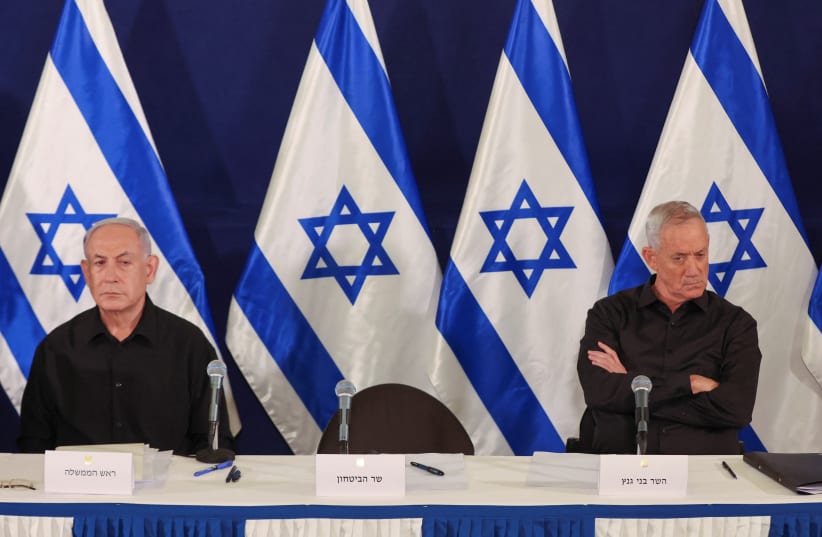Israel’s emergency government faced unrest on Monday as Minister Benny Gantz and his fellow National Unity ministers announced that they would not support the amended budget for the rest of 2023 and 2024 due to its inclusion of coalition funds.
The proposed amendments to the national budget would see Israel postponing funds intended for municipal elections, various education needs and construction until 2024, while focusing on the war effort and Israel’s security and wartime needs in the last month of 2023.
The proposal also included a section stating that in order to keep a budgetary commitment made by the government, the funds will be supplied by cutting down on the coalition funds.
In a separate document, the government explained that while partially cutting down on the funds, it would still be allocating NIS 1.6 billion to salaries for ultra-Orthodox education, the Development of the Negev and Galilee and National Resilience Ministry, the Jerusalem and Jewish Tradition Ministry, and various coalition ventures.
Utilizing coalition funds during the war goes against promises made by both Prime Minister Benjamin Netanyahu and Finance Minister Bezalel Smotrich, who said the funds would be frozen for the duration of the war. For members of the opposition, this wasn’t enough, however, and they demanded that all coalition funds be immediately redirected to the war effort.
“Netanyahu and Smotrich are continuing to exhibit the opacity that tore this nation apart from the inside out until October 7,” said opposition leader Yair Lapid on Monday. “They are continuing to transfer funds for political needs: money that could have been used by the IDF, the evacuees, or the economy that is in free-fall.”
Voting against the budget
He then called on the ministers in the government to vote against it.
Gantz also took issue with this use of coalition funds, telling Netanyahu in a letter on Sunday that he and the other four ministers from his party would oppose the amended budget as long as it included coalition funds or any budget that wasn’t related to the war.
“Transferring coalition funds and funds for ministers that are not related to the war, as the finance minister is trying to advance, will damage Israel’s resiliency and the unity currently existing in Israeli society,” he wrote. “At this time, the entirety of Israeli society must contribute. The whole public knows this, and the Government of Israel ought to operate like this as well.”
Gantz went on to request that the cabinet meeting planned for Monday evening be canceled and he informed Netanyahu that National Unity would vote against the proposal if the meeting went forward anyway.
But the National Unity ministers were not the only ones to oppose the proposal. Economy Minister Nir Barkat (Likud) also told Netanyahu on Monday that he would vote against the amended budget.
Barkat and Smotrich clashed earlier in the war when the Finance Ministry presented its plan to economically aid businesses affected by the war. Barkat was strongly opposed to Smotrich’s plan and presented his own, sharply criticizing the finance minister.
On Monday, Smotrich wrote a long Facebook post where he accused the media of using the coalition funds issue as fodder for a campaign waged against the right-wing government, the Religious Zionist Party, the ultra-Orthodox community, settlers, and Netanyahu.
He then went on to explain that the document detailing coalition funds was only an update as the funds that had been agreed on six months ago were being cut down by 70% for the sake of the war, and the remaining 30% needed to be redistributed.
Smotrich added that what mattered in the amended budget was the billions of shekels for evacuees, the National Security Ministry, the Welfare Ministry, the health system, the Education Ministry, the local authorities in the North and South, and the rehabilitation of the towns close to the Gaza border that have suffered since the war began.
“Anyone who opposes this budget isn’t doing so because a percentage of the funds are questionable,” he wrote. “They’re doing so because they don’t want us to expand the budget and prefer that we continue operating like treasurers and deny Israel’s citizens the aid that the home-front requires during a war.”
He later addressed Gantz in a statement before the meeting.
“We agree on 99% of the budget and disagree on only one percent,” he said. “I call on you to rise above it. Unity allows us all to compromise and give up on one percent that you may disagree with.”
The Prime Minister’s Office backed Smotrich in a statement on Monday, echoing the fact that coalition funds had been reduced by 70%.
“Whatever is left is designated for civil needs like salaries for teachers and not for political use,” said the statement.
Israel’s local authorities also had an issue with the new budget, saying that the Negev, Galilee and National Resilience Ministry had proven itself to be of great help to them but that the handling of the budget would make that more difficult.
In a letter signed by 85 regional council heads and mayors, the local leaders criticized the decision to cut down on the ministry’s budget, which was included in the coalition funds as opposed to being part of the regular national budget.
“Cutting the budget like this was a finger in the eyes of the residents and the authorities who have been on the front-line of the war for two months without a clear end date,” the letter read. “Therefore, we call on the finance minister and are imploring him to change his decision immediately.”

